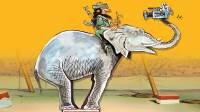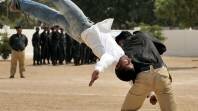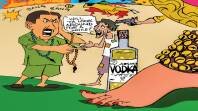"The first casualty of war is truth,” said the US Senator Hiram Warren Johnson in 1918.
The warring sides always try to use media for propaganda and to conceal their acts in the name of what they call operational secrecy, national or public interest.
In most wars media on either sides tends to be nationalistic and patriotic. Every journalist has a specific “information family” to feed back home; hence the issue of editorial priorities.
The death of American soldiers in Afghanistan would be big news in the U.S. and yet video of their coffins would be avoided whereas death of others may just be reported as of suspected militants.
Similarly, the killing of Osama bin Laden in Abbottabad resulted in national celebration in the U.S. but for Pakistani media it was the news of U.S. forces violating Pakistan’s sovereignty and the armed forces’ inability to stop them.
However, being nationalistic in reporting doesn’t always mean ignoring harsh facts including state blunders in the middle of war.
Abu Gharaib prisoners’ abuse scandal is a case in point where the U.S. administration gradually came out of the state of denial and took remedial action.
The Western media was also candid about the U.S. forces’ failure to find any nuclear material that became the basis for Iraq invasion.
Ironically, the media was earlier used and abused by Western governments to propagate the existence of nuclear material in Iraq to pave the way for an invasion.
Today, Pakistani media also has a conflict to report. Unlike American journalists, who would come and go to report Afghan war, Pakistani journalists have to live and stay alive in the war zones and report.
The targeted attacks on media, proudly claimed by the Taliban, are an indication of what may be in store for journalists if and when real conflict begins.
For Western journalists this may be a foreign war on a foreign soil with security policy implications for their country, but for us it is going to be a war of national survival.
In the past information blackouts and patriotic propaganda has not saved us from disintegration and damage to our national polity and social fabric.
Ideally, a sick person must opt for full disclosure of his condition to the doctor for accurate diagnosis and timely prescription.
“Public Credibility” is the name of the game in a conflict situation. While the terrorists never have it, the State too must not lose it in the name of patriotism and national security. The media in particular should not turn a blind eye to the excesses and fundamental rights violations by warring sides.
The state and non-state actors should understand that the media is not a monolithic entity with a centralized command system. Hence “policies and mistakes” of a programme, a media organization or a journalist can always be balanced or responded to, through another programme, media organization or individuals.
Therefore, threatening journalists for reporting or not reporting is something that will always be counter-productive.
While everything is fair in love and war, killing of the messengers, is indeed considered the most unfair practice in the history of wars.
If the national media loses its credibility then no amount of truth can restore it.
The loss of credibility of the national media is basically the loss of credibility of the State institutions and all other forces that depend on it to maintain their images.
That means the Pakistani media needs to be on guard while reporting in-house conflict. There is nothing wrong in being an embedded journalist but we need to be on the move to be able to tell the whole story.
Our stories from the conflict zones should always clarify our limitations and qualify the sources of information instead of being a personalized eyewitness account.
Some TV journalists love to play soldier in front of the camera for glamour and fame and lose sight of the whole truth.
But as long as some of their colleagues cover the other side, the media is doing its job.
Similarly, the non-state actors should also be careful in alienating the media through intimidating tactics. While the State forces try to capture territories, the non-state actors should concentrate on winning the hearts and minds of the people, if they genuinely believe in fighting for a cause.
The best way to influence any media or journalist is to provide solid information that implicates state-actors in violation of human rights and public interest.
At times for media accurate and proven information overshadows the credibility of its source, as the reporter manages to verify it from other sources.
The timing of using particular information becomes a subject matter of editorial judgement in view public interest.
The decision is of course to be independently taken by the editor and not state actors.
It is evident that no matter what happens Pakistani media must report every conflict proactively.
The Pakistani media organizations that had the resources and did send their correspondents to cover war in Lebanon and Iraq should be able to tell the truth about the brewing conflict in the tribal areas.
Also, the media should not fall prey to propaganda of the terrorist organizations as well as the State. We should learn the lessons from our past when information blackout and one-sided versions of the State media were not able to protect our nation and country from tragedies.
Similarly, journalists and reporters should avoid becoming political commentators in conflicts. By doing so, they are usually termed “biased face of journalism.”
For Pakistani media, a lot will be at stake if the war against terror turns into battles in our tribal areas. Reporting complete truth helps the warring sides follow rules of the game and keep their options open.
The conflict will hopefully end one day and the wounds of warring sides will heal. What will not heal will be the injuries, if any, inflicted by propaganda and falsehood duly published and archived like it happened before.
Truth indeed is the first casualty of a war and it never gets buried.
The writer is a TV host, court correspondent and a columnist and these are his personal views. He tweets @Matiullahjan919























